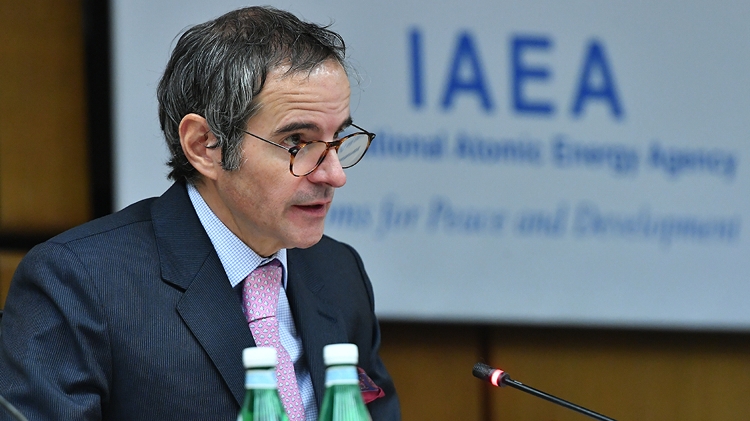Two Decades of Global Nuclear Security: A/CPPNM's Legacy and Mongolia’s Pledge
IAEA Director General Rafael Mariano Grossi, in his address commemorating the 20-year milestone, urged all nations to adopt and implement the CPPNM and its Amendment.

This year marks a pivotal milestone in global nuclear security: the 20th anniversary of the adoption of the Amendment to the Convention on the Physical Protection of Nuclear Material (A/CPPNM). Widely recognized as the cornerstone of the international legal framework for the physical protection of nuclear material and facilities, the Convention—and especially its 2005 Amendment—has helped shape international responses to evolving threats in the nuclear sector. As the world continues to navigate the challenges of emerging nuclear security risks, the International Atomic Energy Agency (IAEA) is rallying renewed global commitment to the Amendment’s goals.
A Foundation for Global Nuclear Security
Originally adopted in 1980 and strengthened by the Amendment in 2005, the Convention on the Physical Protection of Nuclear Material (CPPNM) remains the only legally binding international instrument that addresses the physical protection of nuclear material and facilities used for peaceful purposes. The Amendment significantly expanded the original treaty’s scope when it entered into force in May 2016. It mandated the protection of nuclear materials not only during international transport but also within domestic use, storage, and at nuclear facilities.
Additionally, the Amendment introduced critical updates: criminalization of new offenses, including illicit trafficking and sabotage of nuclear materials and facilities, and provisions for international cooperation in preventing and responding to such acts. These enhancements represent a robust response to emerging global threats, from terrorism to transnational organized crime targeting nuclear materials.
Grossi Calls for Universalization and Action
IAEA Director General Rafael Mariano Grossi, in his address commemorating the 20-year milestone, urged all nations to adopt and implement the CPPNM and its Amendment. “It is in everyone's interest that all States join and implement both. We need to do everything possible against current and emerging threats, and we need to lay a solid foundation for the many communities embracing reliable, low carbon nuclear energy in more and more countries,” he said.
Grossi emphasized the need for a united global approach to nuclear security, especially as more countries pursue nuclear energy as a clean and sustainable solution to energy needs. The universalization of the A/CPPNM is central to this vision, providing not only a shared legal framework but also mechanisms for collaboration, information sharing, and technical assistance.
Mongolia Joins the Amendment, Strengthening Regional Security
On April 25, 2025, Mongolia officially became the 138th Party to the Amendment, joining the 165 countries that are Parties to the original Convention. The move underscores Mongolia’s strategic commitment to strengthening its national nuclear security regime and aligning with global best practices.
“This development reaffirms Mongolia’s strong commitment to the peaceful use of nuclear technology and to preventing nuclear and radiological threats both nationally and regionally,” said Gerelmaa Gombosuren, Acting Head of the Foreign Affairs Division in Mongolia’s Nuclear Energy Commission.
Mongolia’s ratification was facilitated through sustained cooperation with the IAEA, which provided technical support, legal expertise, and capacity-building programs. “The country’s adherence was made possible through close cooperation with the IAEA, whose legal guidance, technical assistance, and capacity-building support have significantly enhanced our institutional preparedness,” Gombosuren added. Mongolia’s accession marks a crucial step in regional stability and sets a strong precedent for other states in Central Asia.
Road to Vienna 2027: Building on the Momentum
The next major milestone on the A/CPPNM agenda is the Second Conference of the Parties to the Amendment, scheduled for April 2027 in Vienna. This follows the first such conference held from March 28 to April 1, 2022, which reviewed implementation progress and shared experiences among States Parties.
Ahead of the upcoming conference, the IAEA is reinforcing its support for States through targeted initiatives. These include forging new partnerships with stakeholders, launching legal and technical assistance programs, and developing country-specific implementation strategies.
Grossi affirmed, “As we prepare for the second conference on the Amendment to the CPPNM, the IAEA will continue its support. We will do this through new partnerships with key decision makers and stakeholders, new initiatives and tailored legislative and technical assistance.”
Broadening Engagement: The Role of Parliamentarians
Recognizing the importance of national legislative bodies in treaty adoption and implementation, the IAEA is expanding its engagement with parliamentarians. This focus was brought to the fore during the International Conference on Nuclear Security: Shaping the Future, held in May 2024.
Through collaboration with the Inter-Parliamentary Union (IPU), the IAEA has intensified outreach to lawmakers, aiming to build political and public momentum for adherence to the CPPNM and its Amendment. These efforts include awareness sessions, scenario-based workshops, and national and regional policy dialogues that simulate real-world security threats.
A Holistic Approach to Future Security
The IAEA’s sustained emphasis on legal adherence, technical capability, political engagement, and international cooperation signals a comprehensive approach to nuclear security. As more countries adopt nuclear technologies for energy and medical purposes, securing these technologies becomes a shared global responsibility.
With continued support for the CPPNM and its Amendment, and increased participation like that of Mongolia, the international community is taking crucial steps to safeguard humanity against nuclear threats while enabling peaceful technological advancement.
ALSO READ
Doha hosts UN-led talks to boost Afghan recovery and counter narcotics efforts through global cooperation
UN chief condemns Russian strikes on Ukraine, warns of nuclear safety risk
Modi Urges BRICS to Lead Global Cooperation Efforts
IAEA Strengthens Global Cooperation on Disused Radioactive Source Management
BRICS Summit: A New Era of Global Cooperation










